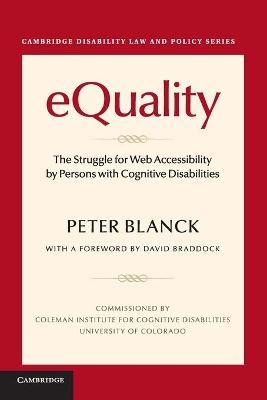
eQuality
Cambridge University Press (Verlag)
978-1-316-63813-2 (ISBN)
Never before have the civil rights of people with disabilities aligned so well with developments in information and communication technology. The center of the technology revolution is the Internet, which fosters unprecedented opportunities for engagement in democratic society. The Americans with Disabilities Act likewise is helping to ensure equal participation in society by people with disabilities. Globally, the Convention on the Rights of Persons with Disabilities further affirms that persons with disabilities are entitled to the full and equal enjoyment of fundamental personal freedoms. This book is about the lived struggle for disability rights, with a focus on Web equality for people with cognitive disabilities, such as intellectual disabilities, autism, and print-related disabilities. The principles derived from the right to the Web - freedom of speech and individual dignity - are bound to lead toward full and meaningful involvement in society for persons with cognitive and other disabilities.
Peter Blanck is University Professor at Syracuse University, New York and chairman of the Burton Blatt Institute (BBI). Blanck received a JD from Stanford University, California, where he was president of the Stanford Law Review, and a PhD in social psychology from Harvard University, Massachusetts. He is chairman of the Global Universal Design Commission (GUDC) and president of Raising the Floor (RtF) USA. His books include Genetic Discrimination: Transatlantic Perspectives on the Case for a European Level Legal Response (with Quinn and de Paor, 2014), Disability Civil Rights Law and Policy (with Myhill, Siegal and Waterstone, 2014), People with Disabilities: Sidelined or Mainstreamed? (with Schur and Kruse, 2013), Legal Rights of Persons with Disabilities: An Analysis of Federal Law (with Goldstein and Myhill, 2013), and Race, Ethnicity, and Disability: Veterans and Benefits in Post-Civil War America (with Logue, 2010).
Foreword David Braddock; Preface; Acknowledgments; About this book; Part I. Opening: 1. Introduction: the struggle for Web equality; 2. Web content equality, the ADA, and participation in society; 3. Web equality and the ADA; Part II. The Advocates' Path: 4. ADA Title III and Web equality: litigation begins; 5. Web equality: second-generation advocacy; 6. Future Web equality advocacy; Part III. Towards Web Equality for People with Cognitive Disabilities: 7. Web content equality and cognitive disabilities; 8. Web equality in action; 9. Towards Web content equality; 10. Equality pocket usability; Notes; References; Index.
| Erscheinungsdatum | 04.10.2016 |
|---|---|
| Reihe/Serie | Cambridge Disability Law and Policy Series |
| Vorwort | David Braddock |
| Verlagsort | Cambridge |
| Sprache | englisch |
| Maße | 152 x 229 mm |
| Gewicht | 710 g |
| Themenwelt | Mathematik / Informatik ► Informatik |
| Recht / Steuern ► Allgemeines / Lexika | |
| Recht / Steuern ► EU / Internationales Recht | |
| Recht / Steuern ► Öffentliches Recht ► Verfassungsrecht | |
| Recht / Steuern ► Privatrecht / Bürgerliches Recht ► IT-Recht | |
| Sozialwissenschaften ► Politik / Verwaltung | |
| Sozialwissenschaften ► Soziologie | |
| ISBN-10 | 1-316-63813-8 / 1316638138 |
| ISBN-13 | 978-1-316-63813-2 / 9781316638132 |
| Zustand | Neuware |
| Haben Sie eine Frage zum Produkt? |
aus dem Bereich


